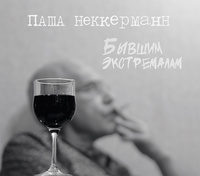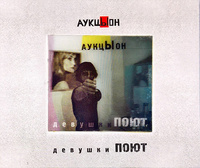The story of Bravo began in 1983 when Yevgenii Khavtan, then a first year student of the Moscow Institute of Railroad Transportation Engineering, arrived for an audition to the musicians of the group Postscriptum, then led by Garik Sukachev. The musicians didn't really make any impression on Khavtan, and he didn't make any impression on them. The only person that interested Khavtan then was the drummer Pavel Kusin, who by that point already played "rather energetically and very masterfully." But the "union" still took place. Yevgenii tried to lead the group away from the style they had adopted: from one that combined art-rock and hard-rock to something that was, in his opinion, more progressive. Moreover, the new guitarist didn't like the bass player, and soon Sergei Britchenkov (author of the text for the song "I Believe") was replaced by bass-guitarist Karen Sarkisov, whom Khavtan had brought in himself. For a short time the new ensemble (Garik Sukachev, Yevgenii Khavtan, Pavel Kusin and Karen Sarkisov) played music of a new-wave style, and their repertoire included the songs of Secret Service, the Police, and the compositions of Garik Sukachev. But because the performances took place in the dance club of the Mosenergtechprom, where the musicians had more or less of a base, the program had to include Italian pop songs. This situation didn't satisfy anyone, and after one of the concerts, Pavel and Yevgenii decided, while sitting in Kusin's kitchen, that they just couldn't continue to collaborate with Sukachev. At the same time, Garik himself came to an analogous conclusion, so the musicians parted by mutual agreement.
The process of creating a new band began with the search for a saxophonist, because, according to Khavtan, to play new wave without a saxophone was impossible. A certain Alexander Stepanenko was brought in from a town in the Moscow region, where he used to play at a local banquet hall. Then Zhanna Aguzarova came along: once Yevgenni got a phone-call in the middle of the night from a woman who declared that she wanted to sing and was looking for an ensemble. "Up until then I'd already heard about her from alternative artists like the Toadstool Mushrooms, whom the KGB had already tried to put in prison, and who had survived by a miracle. They told me that there was a woman like that, so I was already expecting the call. She arrived and won us all over-" the leader of Bravo recalls. The group now consisted of members in the following order: Yevgenii Khavtan (conductor, guitarist, composer) Ivanna Anders (a.k.a. Zhanna Aguzarova- vocal), Andrei Stepanenko (saxophone). The name of the group, by the way, was invented by a friend of Zhanna's. After a visit to the Bolshoi theater, the young woman came to the conclusion that the traditional cries of bravo after a performance weren't a bad name for a band. The musicians agreed that the suggestion was better than anything they had since been considering, like "Twist," "Shake," or "KVN."
The first song of the new ensemble was "Cat," which came about when Yevgenii played Zhanna the tune on his guitar, and the vocalist returned several days later with the lyrics- the poetry of William J. Smith. As Khavtan would later admit, Zhanna had a rare gift to pick up just the right poems for a song. The lyrics she brought and Khavtan's song were the basis for the first 20-minute recording, which was released on a cassette in 1984. "We would play concerts, and already there was a feeling that we were being watched," Khavtan remembers. "To establish ourselves as artists, not knowing at that point what would happen to us later, we made this recording based on what we already performed, with the help of the distributors Viktor Alisov and Yuri Sevostyanov. To this day I still think it stands out as our most significant in terms of its energy, mood, honesty- it has everything I believe a first recording of a group should have." The recording session got its fame due to the fact that the bass guitarist, Andrei Konusov, whose wife had just slammed his finger in the door, played practically with three fingers.
Several weeks after the recording, on March 18, 1984 (Bravo considers this date to be the group's official birthday), the concert hall of the Mosenergotechprom held a performance which sadly ended in the group's arrest. The members were taken to headquarters, and forced to give an account of who had organized the performance and where the tickets were distributed. To put every member in prison was impossible, because there was no complete charge. But Zhanna Aguzarova suffered the most from this incident, because she had problems with her passport and her Moscow registration. She was arrested, and spent several months in confinement while her investigation proceeded. Bravo, meanwhile, got on the famous "black list" of banned musicians- the third or fourth after Aquarium and Alice. Nonetheless, the group continued practice during Aguzarova's absence. But losing faith in the possibility for further creative work as a band, musicians began leaving the group. Bass-guitarist Andrei Konusov left to join Carnival, where he played for about a week before he ended his musical career forever. Instead of him, Timur Murtazaev joined Bravo to play the contrabass. Gnesenskoye Music School graduate Alexander Stepanenko was invited to join the band Dynamic by Vladimir Kuzmin, who needed a professional musician. Bravo's saxophonist was then replaced by Igor Andreev. During this transitory period, Sergei Ryzhenko (from Football, Last Chance and Time Machine) sang instead of Aguzarova, who continued to write letters asking the band to wait for her return. The first debut of the group in its new composition took place at Alexander Lipnitsky's birthday party, which he was holding at his summer house. Among the guests were members of Kino and Aquarium. All participated in the celebration concert, two days after which Yevgenii Khavtan was expelled from his institute.
In order for the KGB to be able to better control the youth culture of the day they organized a creative laboratory for rock music, where they invited Bravo. With the return of Zhanna Aguzarova, the ensemble was given a new status as an amateur band, and caught the interest of Alla Pugacheva, who invited them to participate in the benefit concert "Account 904", which took place in 1986 after the catastrophe in Chernobyl. After a broadcast of this performance, which included the song "I Believe," Bravo found itself in front of an open door to television. The same Pugacheva introduced the musicians in the show "Musical Ring." As Zhanna Aguzarova suggested, xylophonist Pavel Markazyan joined the band, and Bravo was invited to participate in "Rock Panorama-'86," which was held in the Central Tourist's Hall. Several well-established performers and ensembles such as Alexander Gradsky, Time Machine, and Autograph were against the participation of a non-professional group. But the group performed their repertoire with such liveliness that right away they won two awards- the viewer sympathy prize, and the prize for the best show program. The newly developing show-business moguls of the time could not passively let the young band go its own way. Valerii Goldenberg invited Bravo to work for the Moscow regional philharmonic orchestra, and it was under the status of philharmonic musicians that the members of the group participated in the festival "Lithuanica-86," where their program was also chosen as the best. Considering that it was still too early for Bravo to be a professional group, Zhanna Aguzarova, after another scandal, left the group. The newly vacant place in front of the microphone was taken by Anna Salmina, who sang the hit "The King of the Orange Summer," which became the most popular composition of 1986. After Salmina, Tatyana Ruzaeva spent a short time singing in the group, and afterwards Zhanna Aguzarova decided to rejoin the band. In 1987, Bravo released a record on Melodia Records, which sold 5 million copies- for which Khavtan got exactly 260 rubles. The band's performance on "Rock Panorama-'87" was not as successful as the one the previous year because of the rather loud first appearance of new bands such as Brigade-C and the ambitious arrival of Nautilus Pompilus.
In 1988 Zhanna Aguzarova left the group again in order to pursue a solo career. Bravo started auditioning other potential vocalists, including Robert Lentz and Yevgenii Osin. The latter used to attend every single rehearsal, begging them to take him on, even as a drummer or guitarist. In the end, his insistence was rewarded- in 1989 he was taken into the group as a soloist, and already with him, the band recorded some material that was never released, but included, however, "I Feel Sad and Lighthearted" and "Good Evening, Moscow," which gained national fame. A year later, after Osin's departure, Irina Epifanova took the lead vocal. Ironically, two of Bravo's songs call her to mind- "Jamaica" and "Red Light." That same year, in 1990, Khavtan invited Valerii Siutkin into the group. One of the main conditions of his joining was a change in image- Siutkin was persuaded to cut his hair. This led up to their first collaboration, "Vasya," which resulted in the group's second renaissance, according to Khavtan. The first concert with Siutkin as the front man took place August 25, 1990 in the city of Suma. The band was then composed of Khavtan (guitar), V. Siutkin (vocal), I. Danilkin (percussion), S. Lapin (bass), A. Ivanov (saxophone), S. Bushkevich (trumpet).
A year later they released an album "Stylers from Moscow," and made a recording of "Moscow Beat." These two disks, along with the later release of "The Road into the Clouds" became the best selling albums in Bravo's history.
The period from 1991-1994 was one of the most creatively productive for the group. The band gave an enormous number of concerts, bringing together whole stadiums and touring the entire country. By 1992, the recording of "Moscow Beat" was released, and a year later, after a successful tour to commemorate the group's ten year anniversary, they recorded the famous "Road into the Clouds." For the first time in Russia, they included a remix of the song that they did in collaboration with Alexei Soloviev and the band Rocket. The release of the album was preceded by the release of the single "Road into the Clouds," as well as by several other songs. By the time the album was released on General Records in 1994, it was clear that Valerii Siutkin would be leaving in order to start a solo career, since there were disagreements between the members about the future of the group.
That same year in 1994 the composition of the group grew with the addition of St. Petersburg bass player Dmitri Ashmanov, who used to play in the bands Good Night and Never Believe a Hippie, as well as with the return of Kusin and Stepanenko. Robert Lentz was invited to take the place of the again vacant vocal position, and this time agreed. However, for a certain period of time the group concealed the name of its new vocalist, and the rehearsals were conducted in an atmosphere of secrecy, while simultaneously taping the album "At the Crossroads of Spring," which came out in 1996. The release of the album again was preceded by the singles. Khavtan catagorizes this record as one of his favorite, because it had "the right mood and setting." That spring the album was presented in the concert hall "Russia." This was the first performance with the new soloist. During the third concert, on May 24, fans were greeted with another surprise- Zhanna Aguzarova, having just returned from America (where she moved in 1990), came out onto the stage and sang "Cat" and "I Believe."
The next year the musicians recorded "Hits About Love," an album which was a little uncharacteristic of the usual style. At the end of 1997 they held a presentation of the new single "Serenade 2000," released in an original envelope shaped like a heart that was pierced by a guitar. The "Serenade" itself was performed by the duet composed of Robert Lentz and leader of Bakhyt-Kompot Vadim Stepantsov, which made sense since Stepantsov wrote lyrics for Bravo that appeared practically on every album.
"Hits About Love" was released in 1998 by Extraphone. For the 15-year anniversary the group decided to celebrate with a huge tour that they called "Bravomania," with performances that would include three vocalists: Robert Lentz, Zhanna Aguzarova and Valerii Siutkin. After the fifth concert, however, Zhanna left the other musicians and returned to Moscow. The concerts in the Russia Concert Hall that had been planned for the autumn to conclude "Bravomania" were cancelled.
In 1999, the members of the group were pursuing their own individual projects. Alexander Stepanenko recorded two albums, one of which was "Sea." Pavel Kusin came out with a disk entitled "Bravo, Zhanna," that included remixes of the best songs performed by Zhanna Aguzarova. Meanwhile, Yevgenii Khavtan was mastering the computer and putting together a virtual project called "Mickey Mouse and the Stylers." During the summer, the musicians got together to prepare material for a new album. Its first single, "XX Century" came out on a compilation disk along with young groups such as Dances Minus and Cartoons.
По материалам: www.zvuki.ru
БРАВО - свежие публикации:
-

-
 События - Два дебюта, 11.12.2020Два дебютных альбома Браво переизданы спустя 36 лет. Релиз представляет лидер группы Евгений Хавтан »»
События - Два дебюта, 11.12.2020Два дебютных альбома Браво переизданы спустя 36 лет. Релиз представляет лидер группы Евгений Хавтан »» -
 Анонс - Браво, 2020!, 20.12.2019Главные московские стиляги выступят в столице прямо в новогоднюю ночь »»
Анонс - Браво, 2020!, 20.12.2019Главные московские стиляги выступят в столице прямо в новогоднюю ночь »»
БРАВО

The story of Bravo began in 1983 when Yevgenii Khavtan, then a first year student of the Moscow Institute of Railroad Transportation Engineering, arrived for an audition to the musicians of the group...
Подробности из жизни:
The story of Bravo began in 1983 when Yevgenii Khavtan, then a first year student of the Moscow Institute of Railroad Transportation Engineering, arrived for an audition to the musicians of the group Postscriptum, then led by Garik Sukachev. The musicians didn't really make any impression on Khavtan, and he didn't make any impression on them. The only person that interested Khavtan then was the drummer Pavel Kusin, who by that point already played "rather energetically and very masterfully." But the "union" still took place. Yevgenii tried to lead the group away from the style they had adopted: from one that combined art-rock and hard-rock to something that was, in his opinion, more progressive. Moreover, the new guitarist didn't like the bass player, and soon Sergei Britchenkov (author of the text for the song "I Believe") was replaced by bass-guitarist Karen Sarkisov, whom Khavtan had brought in himself. For a short time the new ensemble (Garik Sukachev, Yevgenii Khavtan,…
Свежие альбомы
Хроника17 апреля
1970 – Пол Маккартни выпустил свой первый сольник - "McCartney", записанный полностью самим музыкантом - от ударных до финального сведения »»
Родились
Paul SMITH (1922)
James LAST (1929)
Chris BARBER (1930)
Joe ROMANO (1932)
Jan HAMMER (1948)
Michael SEMBELLO (1954)
Maynard James KEENAN (1964)
Акакий Назарыч ЗИРНБИРНШТЕЙН (1964)
Liz PHAIR (1967)
REDMAN (1970)







